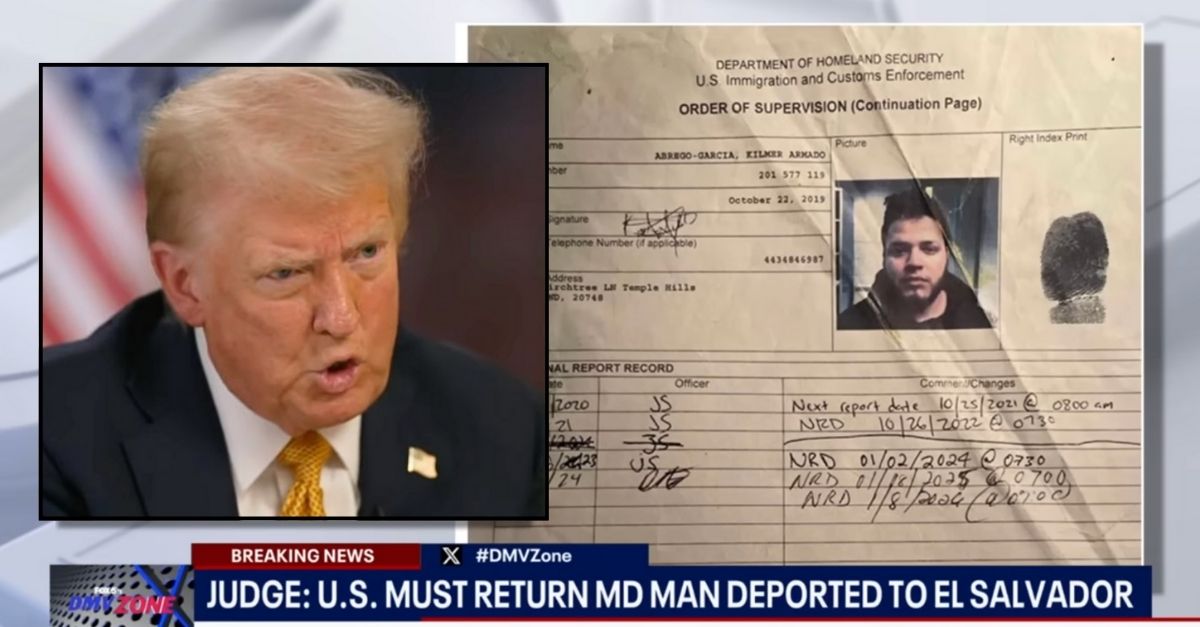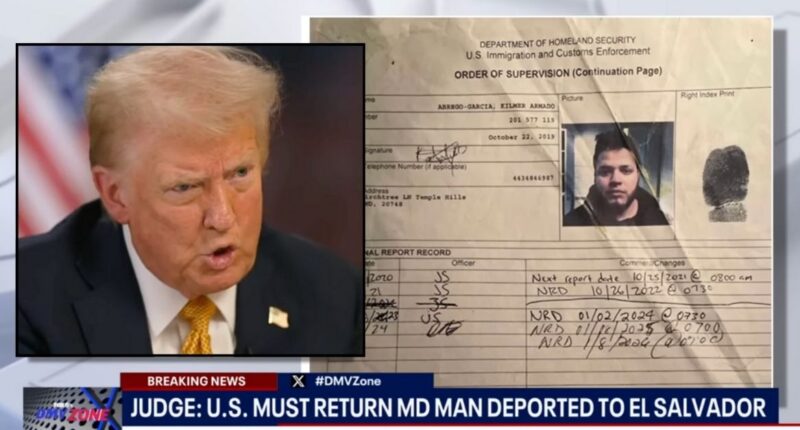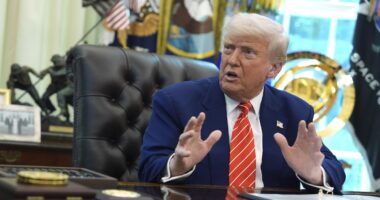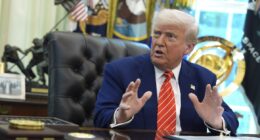
President-elect Donald Trump appeared on “Meet the Press” on Sunday, December 8, 2024. Additionally, background information included immigration records for Kilmar Abrego Garcia.
Chief Justice John Roberts intervened by extending a Monday deadline set for the Trump administration. This extension was to bring back a protected resident of Maryland who was mistakenly deported to El Salvador. This incident occurred as a result of President Donald Trump’s deportations of Venezuelan migrants. The Justice Department had requested the U.S. Supreme Court to take action in ensuring the resident’s return to the United States.
Roberts, in an order issued on Monday afternoon, temporarily suspended a preliminary injunction. This injunction had been put in place by U.S. District Judge Paula Xinis, who had given the Department of Justice just over three days to facilitate the return of Kilmar Abrego Garcia. The judge referred to the deportation as unlawful. Abrego Garcia, a 29-year-old, was incorrectly sent to El Salvador on March 15 under Trump’s deportation initiative, which used the Alien Enemies Act of 1798 to expedite mass deportations. These actions were subsequently halted by a federal judge due to the absence of due process for those being deported.
Abrego Garcia was in the U.S. with protected legal status at the time of his deportation. His wife and 5-year-old child are both U.S. citizens. The DOJ admitted to the lower court on Friday that his deportation was an “administrative error,” leading to the suspension of a 15-year DOJ vet who made the public confession.
Roberts said Monday that the midnight deadline set by Xinis would be put on hold until the Supreme Court can come to a conclusion on whether to lift the judge’s order altogether.
“It is further ordered that a response to the application be filed on or before Tuesday, April 8th, 2025, by 5 p.m.,” Roberts added.
Instead of waiting until Tuesday, though, Abrego Garcia’s attorneys chose to file their response mere moments after the Supreme Court decision was handed down.
“This case is one of one,” wrote Abrego Garcia’s legal team. “It presents the ‘extraordinary circumstances’ of the Government conceding that it erred in removing Kilmar Armando Abrego Garcia ‘to a foreign country for which he was not eligible for removal,”” the response said. “The Government knew about the court order prohibiting Abrego Garcia’s removal to El Salvador, and admits that removing him in violation of that order was an ‘administrative error.’ Abrego Garcia has never been charged with a crime, in any country. He is not wanted by the Government of El Salvador. He sits in a foreign prison solely at the behest of the United States, as the product of a Kafka-esque mistake.”
More from Law&Crime: ‘Should not have been removed’: 15-year vet at Justice Department suspended after admitting Trump wrongly deported father with protected legal status
With just hours to go before the Trump administration was set to return Abrego Garcia, the DOJ tossed up its “Hail Mary” bid to the Supreme Court on Monday morning — asking it to put the kibosh on the efforts — after Xinis doubled down on her order Sunday.
In a 22-page opinion, Xinis said she would not back off from forcing the Department of Homeland Security and DHS Secretary Kristi Noem, who are being sued by Abrego Garcia, to return him to U.S. soil. The DOJ filed an emergency motion to stay Xinis’ preliminary injunction on Saturday with the 4th Circuit Court of Appeals and lower court, “given the urgency of harms to the government,” the DOJ filings said. The 4th Circuit denied the motion on Monday shortly before the DOJ filed its Supreme Court application.
In prior arguments as well as the SCOTUS filing Monday, DOJ lawyers called Xinis’ order “indefensible” and impossible to carry out on account of where he’s being held.
“The United States does not control the sovereign nation of El Salvador, nor can it compel El Salvador to follow a federal judge’s bidding,” wrote Solicitor General D. John Sauer in the DOJ’s Supreme Court application to vacate the order.
“The Constitution vests the President with control over foreign negotiations so that the United States speaks with one voice, not so that the President’s central Article II prerogatives can give way to district-court diplomacy,” Sauer said. “If this precedent stands, other district courts could order the United States to successfully negotiate the return of other removed aliens anywhere in the world by close of business. Under that logic, district courts would effectively have extraterritorial jurisdiction over the United States’ diplomatic relations with the whole world.”
Xinis, a Barack Obama appointee, dismissed the DOJ’s claim that the Trump administration had its hands tied with Abrego Garcia in her Sunday filing. She said the U.S. can’t prop up the prison in El Salvador as “one of the tools” in the government’s deportation shed — as Xinis said Noem has previously claimed — and then try to act like nothing can be done.
“Abrego Garcia will suffer irreparably were he not accorded his requested relief,” Xinis said. “The risk of harm shocks the conscience. Defendants have forcibly put him in a facility that intentionally mixes rival gang members without any regard for protecting the detainees from harm at the hands of the gangs.”
More from Law&Crime: ‘Pretty sketchy looking’: Judge takes DOJ lawyer to the woodshed over Trump’s mass deportations and whether federal court orders are being ignored
Abrego Garcia’s lawyers said Monday in their response to Roberts’ order that they believed the government was unlikely to succeed on the merits of the case.
“Its application to this Court is built on a series of strawmen,” they said. “First, that ordering the Government to facilitate Abrego Garcia’s return requires ‘compel[ling] El Salvador to follow a federal judge’s bidding.’ Second, that the district court lacks jurisdiction over this case … based on a ‘decision or action by the Attorney General to … execute removal orders against any alien.’ And third, that complying with the order requires letting ‘a member of a foreign terrorist organization into America tonight.’
“None of this is true,” the lawyers insisted.
To support their case, Abrego Garcia’s lawyers filed an amicus curiae brief with the 4th Circuit on Sunday, showing support from “world-renowned scholars of constitutional law” who say Abrego Garcia’s removal was “extreme” and legally unprecedented. “Not surprisingly, amici are not aware of any precedent or recognized constitutional principle supporting the government’s argument,” the statement of amicus curiae says, with it being filed by law professors Erwin Chemerinsky, Martha Minow and Laurence Tribe on Sunday night.
“If this court were to adopt the government’s position here, it would dramatically expand the Executive Branch’s power at the expense of fundamental individual liberties, and diminish both the Legislative Branch’s and the Judicial Branch’s power in unprecedented and dangerous ways,” the trio concluded. “If the government’s argument were correct, the Executive Branch would possess a shuddering degree of power — power that the President could wield in extreme and extraordinary ways, including against American citizens that the President simply disfavors.”
Love true crime? Sign up for our newsletter, The Law&Crime Docket, to get the latest real-life crime stories delivered right to your inbox.










